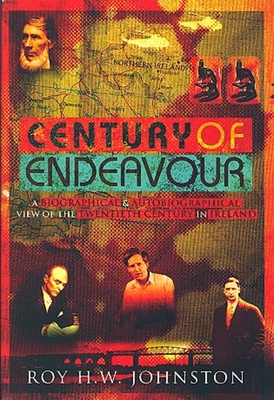Century of Endeavour
Ruán O'Donnell reviews Century of Endeavour, a biographical and autobiographical view of the twentieth century in Ireland by Roy H.W. Johnston, Tyndall Publications/The Lilliput Press, ISBN 1 84351 080 4, €40 pbk

ROY JOHNSTON a prominent and influential figure of the republican left in Ireland, requires no introduction for readers of Irish Democrat. After a problematic 'first edition' by Academica/Maunsel in the USA in 2003, Johnston's long awaited magnum opus is finally available in Europe.
Lilliput Press, Dublin, deserve commendation for tackling this complicated work of years. It is immediately apparent that Century of Endeavour is an unorthodox publication and arguably not strictly a book at all. Johnston has never taken the casual middle path and has consistently, over decades, agitated with purpose and energy for progressive politics.
The first indication that Century will not conform to traditional modes is its striking cover, adorned with images of scientists John Tyndall and John Desmond Bernal, as well as the more familiar portraits of Eamon de Valera and Sean MacBride. This coupling goes beyond standard definitions of eclectic and serves notice that the contents will defy expectations.
A single authored biography that is also autobiography is extremely unusual, yet the novelty of this hybrid is surpassed by Johnston's development of a hypertext mode accessed via website and a planned CD-ROM. The hardcopy is the key to an elaborate archive of pertinent primary sources, secondary commentary and useful adjuncts.
Further innovation is present in the form of interspersed passages, highlighted by italics, in which Johnston reflects with self-conscious retrospection on his own main narrative. The copious appendices which follow are essentially synoptic essays on the major themes explored in the book.
Johnston's vision of information, education and transmission is not simply iconoclastic, it is revolutionary. He is pioneering a format which may well prove the model for the writing of political history and Century should rank as an essential text for no other reason. Unsurprisingly, given the inspirational ambition of this work and the dedication of its author, there are many, many salient reasons for adding Century to a collection.
Johnston clearly had several objectives in writing this book. One was to document the story of his father, Joe Johnston, a Tyrone Presbyterian and a leading Ulster liberal voice on all-Ireland self-determination and economic affairs. Author of Civil War in Ulster and a senator from 1939-54, Johnston senior was an intriguing and important personality.
Roy Johnston's autobiography is interspersed, where appropriate, with the account of his father's life and both progress by installments through the context of the 1900s. The result is a generally chronological dual biography with numerous digressions and anecdotes. This strand of the book counterpoints the author's analysis of a prodigious array of political, social and economic matters. The primary perspective is that of 'left-orientated elements', especially with regard to those grappling with the national question whilst striving 'to take the gun out of Irish politics'.
The evolution of the republican movement during the tenure of Cathal Goulding as chief of staff is treated with unrivalled insight and few would contend that Johnston's input was anything less than crucial. Chapters seven and eight cover this ground in a manner which Johnston acknowledges falls short of 'rounded history', an approach he defends as being necessary to avoid 'unbalancing' the memoir. Johnston may be correct in his assessment and there is still room for him to revisit this contentious topic in a discreet and fleshed out study.
Opinion concerning the processes used by elements within the Irish and British establishments to derail 'political republicanism' in favour of less threatening traditional forms also warrants elaboration. Here, and in other places, Johnston poses questions for future historians. As yet, Johnston's former comrades have not see fit to contradict his account. Access to the text might have explained this silence in the past but there are now grounds to suspect that many who took the route towards and into the Labour Party would rather not engage.
Detractors may well point to the excessive profusion of abbreviations, certain idiosyncratic narrative forms and structural complexities. These are not criticisms of substance given the scale of the book's achievement. The index, in four parts, fails to provide full coverage of the main text, yet this flaw is symptomatic of the vast scope of the project. The strength of the book is the constant presence of a leading participant who draws upon private archives, records of the Wolfe Tone Society, the diaries of C. Desmond Greaves, Worker's Party documents and many other inaccessible resources.
In hard copy and hypertext, Johnston has made a valuable contribution to proving the potential of technology in modern research and writing.
Connolly Association, c/o RMT, Unity House, 39 Chalton Street, London, NW1 1JD
Copyright © 2006 Run O' Donnell

